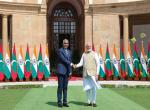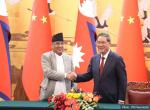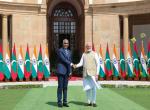During his last week’s visit to New Delhi, Afghan President Hamid Karzai sought a pro ‘active’ Indian involvement in Afghanistan’s security even as across the border, Chinese Premier Li Kequiang committed to improve the connectivity of the strategically located Gwadar port to realize the Pakistani dream of turning it into a regional trade hub for China, Afghanistan and the Central Asian Republics (CARs).
Also the first US convoy of 50 trucks and armoured vehicles reached Quetta from Kandahar on 21 May, carrying US equipment being withdrawn from Afghanistan through the Chaman crossing on the Pak-Afghan border to Port Qasim, Karachi. This came even as Pentagon put in a request for ‘reprogramming’ its budget for 2013 on account of additional expenditure of $ 1.8 billion it had incurred when Pakistan had closed NATO supply routes to Afghanistan from Karachi last year.
Contrasting events over the last week point to how Pakistan’s foreign policy trumps India’s foreign relations in the sub-continent. It also indicates how Pakistan with an economy propped up by aid handouts finds itself on the same table as US and China without declaring itself a regional superpower. India on the other hand appears to be blundering through its foreign policy options or operating with its hands tied. The question to be asked is whether India lacks the capability to articulate and realize its interests in Afghanistan or its foreign policy manoeuvers have been constrained by certain ‘red lines’ Pakistan has managed to frame through a dexterous manipulation of international interests and concerns.
Afghan-Pak Relationship
Despite a common and porous border, ethnic bonds and shared Pashtun culture, Pakistan’s relations with Afghanistan have at best, been tenuous. After the dismal outcome of the recent Afghan-Pak-UK trilateral and the failure of Hagel and Kerry to achieve a significant breakthrough in Af-Pak, it is becoming increasingly difficult to predict what direction the relations between the two countries will take after the ongoing security transition in Afghanistan. Quite simply, as one analyst put it, "There are way too many things in play.” The failure of the two countries to come to an understanding on their relationship has bred an atmosphere of suspicion and frustration making third party intervention on behest of either side very difficult.
Other than the China and Iran, the two neighbours Pakistan shares with Afghanistan, Pakistan’s relations with US and India have been playing a crucial role in shaping its strategy in Afghanistan. Besides the Pakistani fears of encirclement by India and the perceived Indian interference in its internal security affairs particularly in Baluchistan, it is the blatant Pakistani demand at virtually all recent bilateral and multilateral forums that Afghanistan has no meaningful relationship with India and it has proved to be a major obstacle in ties between the two South Asian countries. This insistence has been shrill of late on Indo-Afghan bilateral security cooperation, which is largely confined to training of personnel as against any Indian military presence on Afghan soil. What is worse is the tacit support such demands have received from countries such as the UK.
However, it is the choppy dynamics of its relations with the US that has had overbearing influence on Pakistan’s strategic outlook and external policy. Post 2001, US has displaced India as Pakistan’s prime foreign policy concern which in turn strongly influences the country’s dealings with Afghanistan because it regards the US as one of the major causes of instability in Afghanistan and indeed, within Pakistan itself.
Like all regional stakeholders, Pakistan has also hedged its interests in Afghanistan, which unfortunately is premised on the outcome that in the end, US will not have its way in Afghanistan. It is this factor that makes Pakistan’s hedging strategy distinct from that of other regional actors, who too are safeguarding their interests, but against the uncertainty of the final outcome in Afghanistan. Therefore, Pakistan will oppose directly or indirectly any move to prolong US presence across the border. Many analysts infer that it is this position which induces duplicity in Pakistan‘s approach towards US/NATO in Afghanistan.
Contrary to what many in India would like to believe, it is very likely that the withdrawal of US troops from Afghanistan and the consequent reduction of US influence in the region will take away even the economic cooperation plank from the Indo-Afghan relationship . Pakistan, on the other hand, has doubly hedged its bets against Indian role in Afghanistan by reinforcing the perception that its support for the Afghan Taliban is a reaction to Indian assertiveness in Afghanistan. This ensures that any Pakistani assistance in furthering Afghan reconciliation that involves Taliban’s cooperation comes with the underlying precondition of keep India out of the picture. A condition that remains valid even after the US drawdown and as long as Taliban remains a force to reckon with in Afghanistan. It also gives credence to this ungainly argument that a part of Afghanistan’s woes are due to India’s ‘hegemonistic’ aspirations in the region.
Thus, India finds itself in a position where Pakistan’s support to the insurgency in Kashmir is being viewed as legitimate assistance to a local independence struggle while any notion that India might harbor for a tit-for-tat in Baluchistan will be construed as interference in Pakistan’s internal affairs and in the eyes of the international community an ‘irresponsible’ act to destabilize the fragile situation in Afghanistan and regional peace. International sentiments remain equally ‘understanding’ of Pakistani fears on ‘encirclement’ by India, while it is India that is finding itself increasingly isolated by China in its own backyard.
In addition to managing its affairs with the US, Pakistan appears to utilise its ‘all-weather’ relationship with China as a counterbalance to both the US and India and at the same time partake economic benefits through development of bilateral trade . It also looks to increased transit revenue on account of trade traffic through its transportation routes and ports as a spin off from the Chinese economic activity in Afghanistan. The recent handover of commercial operations of Gwadar port to the Chinese is an indicator of this approach Pakistan is also trying to manage its disagreements with Iran over the strategic approach to Afghanistan and Central Asia. This would provide Pakistan access to Iran’s energy resources, prevent diversion of potential transit trade revenue from Gwadar and simultaneously deny India access to the CARs. The recent Iran Pakistan gas pipeline deal with Iran showcases this approach which Pakistan formalized against US opposition and the seemingly irreconcilable Sunni-Shia sectarian divide.
Internally the situation in Pakistan is equally confounding as the country which continues to face major concerns on economic stability, growth and security, professes lack of state control over militants on its territory and what it has got many to believe- its nuclear arsenal. Pakistani non-state actors who appear to be beyond Pakistani control (in the process absolve it of any responsibility for their actions) strangely, at times, find common ground with the Pakistani state in pursuit of their ‘criminal’ objectives. The recent decision of Tehrik-e-Taliban Pakistan (TTP) to participate in Afghan Taliban's spring offensive in Afghanistan against Afghan and foreign forces is one such case. TTP also confirmed that its cadres were already active against Afghan and foreign forces, especially in the Logar province.
Red Lines
Through a deft management of international opinion and a subtle exploitation of their vulnerabilities and fears, Pakistan has managed draw certain ‘red lines’ for Indian foreign policy on Afghanistan. The first line ensures India deals with Pakistani support to foreign militants in Kashmir on its side of line of control only, as an internal security issue. Second, any support to militancy in Baluchistan, even financially, is an irresponsible act of interfering in the internal affairs of an economically and politically fragile nuclear weapon state. Third line restricts support to Afghanistan to non-military /security areas and no measure is taken to upstage Pakistan’s influence and leverage with the government of the day in Afghanistan. That comes with minor discomfort of issues such as no Most Favoured Nation status, no transit for Indian trade, TAPI (Turkmenistan, Afghanistan, Pakistan and India) gas line remains a pipe dream etc.
Conclusion
It is imperative for India, therefore, for to find its way out of the ‘foreign policy confines’ Pakistan has created for it with regards to its relations with Afghanistan. There is a need to replace the theory of Indian ‘irresponsibility’ in seeking a greater role in future of Afghanistan with Pakistani ‘responsibility’ to acknowledge the fact that that as an independent sovereign nation, Afghanistan has the right to manage its own relations with its neighbours driven by the interest of its own people.
Published Date: 28th May 2013









Post new comment